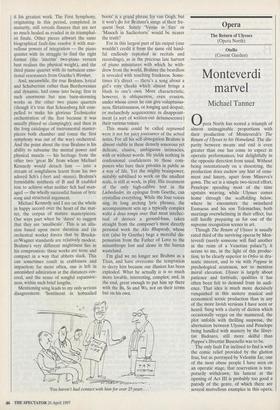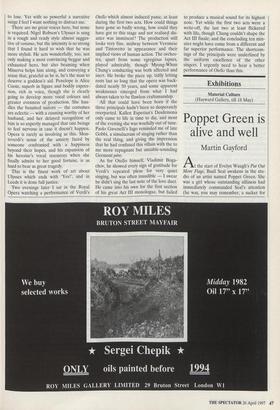Opera
The Return of Ulysses (Opera North)
Otello (Covent Garden)
Monteverdi marvel
Michael Tanner
Opera North has scored a triumph of almost unimaginable proportions with their production of Monteverdi's The Return of Ulysses to his Homeland. The dis- parity between means and end is even greater than one has come to expect in operatic performances, but delightfully in the opposite direction from usual. Without being ostentatiously on a shoestring, the production does eschew any hint of orna- ment and luxury, apart from Minerva's gown. The set is a simple two-tiered effort, Penelope spending most of the time upstairs weaving, while Ulysses comes home through the scaffolding below, where he encounters the swineherd Eumaeus and his son Telemachus, both meetings overwhelming in their effect, but still hardly preparing us for one of the supreme recognition scenes in art.
Though The Return of Ulysses is usually rated third of the surviving operas by Mon- teverdi (surely someone will find another in the ruins of a Venetian palace?), it seems to me, in the light of this produc- tion, to be clearly superior to Orfeo in dra- matic interest, and to vie with Poppea in psychological acuteness, not to mention moral elevation. Ulysses is largely about patience and fortitude, qualities it has often been felt to demand from its audi- ence. That idea is much more decisively vanquished in this austere musical and economical scenic production than in any of the more lavish versions I have seen or heard. Sung with a clarity of diction which occasionally verges on the mannered, the plot unfolds with thrilling suspense, the alternation between Ulysses and Penelope being handled with mastery by the libret- tist Badoaro, still more skilful than Poppea's librettist Busenello was to be.
The only fault I'm inclined to find is with the comic relief provided by the glutton Irus, but as portrayed by Velentin Jar, one of the most obese people I have seen on an operatic stage, that reservation is tem- porarily withdrawn; his lament at the opening of Act III is probably too good a parody of the genre, of which there are several marvellous examples in this opera, to lose. Yet with so powerful a narrative surge I feel I want nothing to distract me.
There are no great voices here, but none Is required. Nigel Robson's Ulysses is sung in a rough and ready style almost sugges- tive of verismo, but the intensity is so strong that I found it hard to wish that he was more stylish. He acts wonderfully, too, not only making a most convincing beggar and exhausted hero, but also beaming when Minerva helps him along, and conveying a sense that, grateful as he is, he's the man to deserve a goddess's aid. Penelope is Alice Coote, superb in figure and bodily expres- sion, rich in voice, though she is clearly going to develop more vocal colours and greater evenness of production. She han- dles the besuited suitors — the costumes are eclectic — with a cunning worthy of her husband, and her delayed recognition of him is so expertly managed that one beings to feel nervous in case it doesn't happen. Opera is rarely as involving as this. Mon- teverdi's sense of the anxiety faced by someone confronted with a happiness beyond their hopes, and his expansion of his heroine's vocal resources when she finally admits to her good fortune, is as hard to bear as great tragedy.
This is the finest work of art about Ulysses which ends with `Yes!', and in Leeds it is done full justice.
Two evenings later I sat in the Royal Opera watching a performance of Verdi's Otello which almost induced panic, at least during the first two acts. How could things have gone so badly wrong, how could they have got to this stage and not realised dis- aster was imminent? The production still looks very fine, midway between Veronese and Tintoretto in appearance and their implied views of human action. The orches- tra, apart from some egregious lapses, played admirably, though Myung-Whun Chung's conducting was both affected and inert. He broke the piece up, tidily letting rests last so long that the opera was back- dated nearly 50 years, and some apparent weaknesses emerged from what I had always taken to be flawless craftsmanship.
All that could have been born if the three principals hadn't been so desperately overparted. Kallen Esperian's Desdemona only came to life in time to die, and most of the evening she was woefully out of tune. Paolo Gavenelli's Iago reminded me of late Gobbi, a simulacrum of singing rather than the real thing, and giving the impression that he had confused this villain with the to me more repugnant but amiable-sounding Germont pere. As for Otello himself, Vladimir Boga- chov, he showed every sign of gratitude for Verdi's repeated pleas for very quiet singing, but was often inaudible — I swear he didn't sing the last note of the love duet. He came into his own for the first section of his great Act III monologue, but failed to produce a musical sound for its highest note. Yet while the first two acts were a write-off, the last two at least flickered with life, though Chung couldn't shape the Act III finale; and the concluding ten min- utes might have come from a different and far superior performance. The shortcom- ings of the principals were underlined by the uniform excellence of the other singers. I urgently need to hear a better performance of Otello than this.



































































 Previous page
Previous page